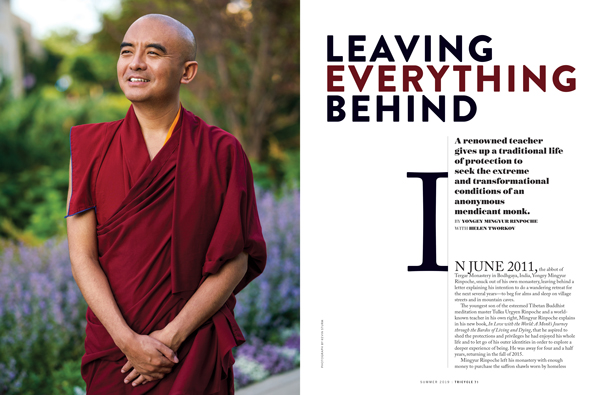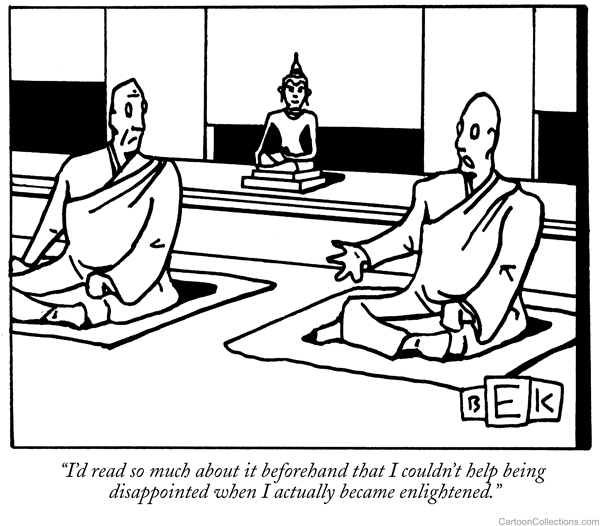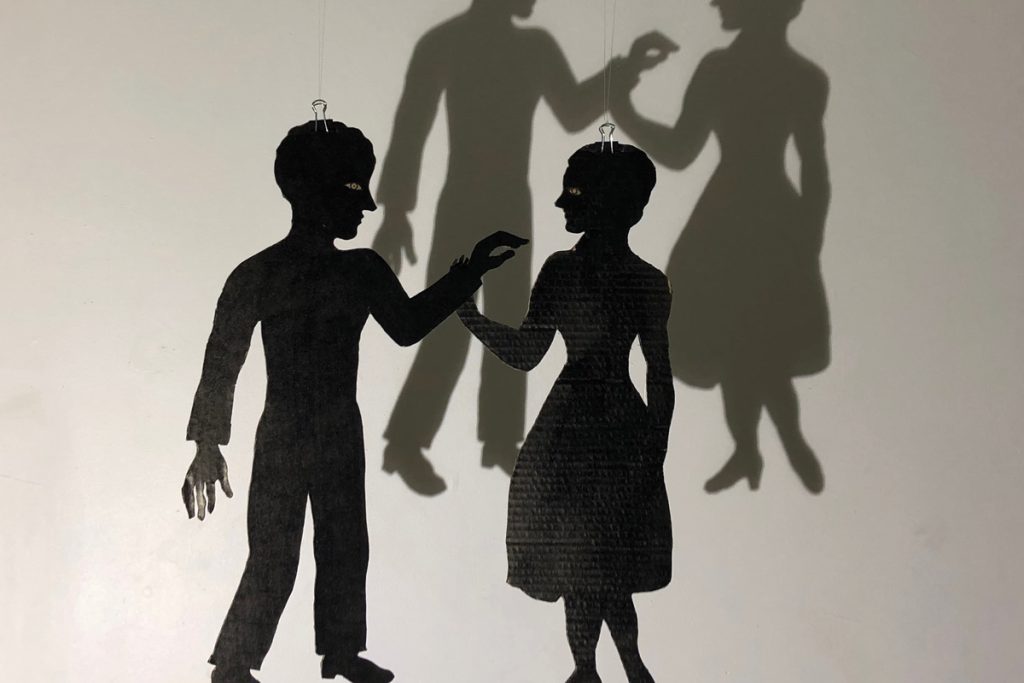Sexual abuse in Buddhist sanghas continued to spark spirited discussions among our readers this quarter. “The damage I see from leaders being abusive to students,” wrote Cindy Bird in response to David Loy’s article “In the Shadows of Transference”, “in addition to the damage to their own communities, is the damage done to those in other communities. Many Western Buddhists are now refusing to align with any community.” Acharya Malcolm Smith took up this thread in his critique of our interview with media studies professor Bernhard Pörksen (“Unmasking the Guru”), pushing back against Pörksen’s claim that we are currently witnessing “an implosion of spiritual authority” in Tibetan and Zen groups. “It may be the case that there have been some sensational failures,” he wrote, but “they have primarily occurred in the area of heavily marketed dharma organizations, such as Rigpa, Shambhala International, Diamond Mountain, and so on. . . . It is not the case that there is an implosion of authority in buddhadharma in general or Vajrayana in particular.” Among other points, Smith took issue with Pörksen’s portrayal of how gurus are viewed within Vajrayana itself, writing that they are not meant to be seen as saviors. The importance of viewing gurus as fallible human beings was picked up by many other commenters: Linda Sperling wrote that the guru’s “true function is to serve as a spiritual friend, not as an object of worship,” and “as Professor Pörksen so aptly points out, we have to adjust our expectations.”
Do school mindfulness programs violate the US Constitution’s separation of church and state? Religious studies professor Candy Gunther Brown discussed her view that some programs have overstepped their bounds with Tricycle’s Editor and Publisher, James Shaheen, in our May podcast episode (tricycle.org, May 30, 2019). While one reader, Justin Higgins, agreed, writing, “let’s not blur the lines [between secular and religious] just because it works in our favor,” many others insisted that mindfulness is not religious. “If mindfulness requires no teaching about Buddhism to practice, then it shouldn’t be considered a religion,”wrote Eric Sullinger.“Teaching how to look at the mind is not a religion,” Kim Desrosiers agreed. “Should we also not teach kindness in school because Western religions teach practices for patience and love? This is fear-based, theist-centered nonsense.”
In “Overcoming the Vortex of Desire,” Rob Nairn, Choden, and Heather Regan-Addis offered a set of practices to recognize how craving plays out in our daily lives. Denise Harter “was struck by the examples of objects of desire: designer clothing, cosmetic surgery, cappuccino, exotic holidays,” which “seem to be the cravings of a particular demographic—white, educated, upper income—or at least a stereotypical version of the same.” She continued, “I am white and educated but far from wealthy. I am used to reading and hearing things like this and trying to internally translate them into something personally meaningful, but I still feel subtly excluded. I’m looking forward to the time when we can all see the bubble we live in and try to extend our focal range beyond it, so that we can learn about and relate to a much wider range of people.”
 Two moving personal essays from our Summer 2019 issue served as inspiration for our readers to do their own inner work. Sarah Conover’s account of being orphaned at a young age (“Lost at Sea”) stuck with reader “Trudy.” “Your story is profound,” she wrote, “and to be able to live it and tell it in this equally penetrating way is a gift to anyone fortunate enough to read it.” “Lotus1” added, “You are inspiring in how you have transformed your pain and loss into such a substantial presence in the world. I too have wondered what the gifts of pain in my life created in me.” And in response to Yongey Mingyur Rinpoche’s “Leaving Everything Behind,” in which the Tibetan Buddhist teacher tells, with Tricycle founder Helen Tworkov, how he gave up the trappings of a comfortable life to go on a multiyear wandering retreat, “Mtn Maddy” embarked on a personal 7-day retreat at home, commenting, “It’s my very first time attempting to do this, but you have inspired me to press on.” Good luck, Mtn Maddy!
Two moving personal essays from our Summer 2019 issue served as inspiration for our readers to do their own inner work. Sarah Conover’s account of being orphaned at a young age (“Lost at Sea”) stuck with reader “Trudy.” “Your story is profound,” she wrote, “and to be able to live it and tell it in this equally penetrating way is a gift to anyone fortunate enough to read it.” “Lotus1” added, “You are inspiring in how you have transformed your pain and loss into such a substantial presence in the world. I too have wondered what the gifts of pain in my life created in me.” And in response to Yongey Mingyur Rinpoche’s “Leaving Everything Behind,” in which the Tibetan Buddhist teacher tells, with Tricycle founder Helen Tworkov, how he gave up the trappings of a comfortable life to go on a multiyear wandering retreat, “Mtn Maddy” embarked on a personal 7-day retreat at home, commenting, “It’s my very first time attempting to do this, but you have inspired me to press on.” Good luck, Mtn Maddy!
The Question
What Are Your Retreat “Cheats”?
I always bring a memory foam bedroll along with enough protein bars to share. Retreats are difficult. There is no harm in providing small comforts for yourself, just as there is no merit in denying yourself and making the rigors more rigorous. Just don’t make yourself too comfortable. A little discomfort is key to waking up.
—Teri Jo Tinus
When I’m on retreat, I don’t cheat. But I’ve been co-manager of a re- treat center for the last two years and I’ve seen things you wouldn’t believe . . . we are funny, helpless, and lovable human beings, after all.
—Eleonora QuanticFoam Monti
Running to CVS for earplugs. Some Buddhists snore very loudly.
—Leslie Michelle
I bring my own stash of single-serving instant coffee packets. They have coffee in the kitchen, but it’s not always available before the early morning pujas. And they chant Green Tara pretty quick for 5 a.m.
—William French
Most retreats are quite expensive. When I can go on a retreat once a year, I am not going to spend that money and then cheat. What is the point? Just stay home.
—Sandra Gail Rae

For the next issue:
Who’s your favorite Buddhist figure, past or present? Email your brief responses to editorial@tricycle.org.
♦
To be considered for the next issue’s Letters to the Editor, send comments to editorial@tricycle.org, post a comment on tricycle.org, or tweet us at @tricyclemag by August 23, 2019.
Correction:
“Buddhism by the Numbers: The Economics of Mindfulness” incorrectly presented the annual revenues for Calm and Headspace at $80 billion and $100 billion, respectively. The correct figures are in the millions. We regret the error.
Thank you for subscribing to Tricycle! As a nonprofit, we depend on readers like you to keep Buddhist teachings and practices widely available.

